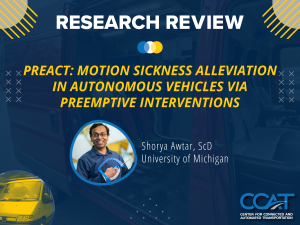Presented By: Center for Connected and Automated Transportation
PREACT: Motion Sickness Alleviation in Autonomous Vehicles via Preemptive Interventions — CCAT Research Review
Shorya Awtar, Sc.D.

While autonomous vehicles (AVs) promise a transportation future with several benefits, a high incidence of motion sickness among passengers remains a major impediment to the widespread adoption of this promising technology.
Motion sickness in a moving vehicle is the consequence of frequent acceleration and resulting inertial forces associated with driving actions such as speeding, braking, and turning. In a traditional vehicle, the driver anticipates the inertial consequences of their own driving actions, and accordingly makes subtle preemptive corrections. The passenger ends ups passively reacting to the inertial forces, which leads to a far greater incidence of motion sickness. In a future world of AVs, every occupant will be a passive passenger, resulting in a greater likelihood and severity of motion sickness.
In this talk, Professor Awtar will present the development and experimental validation of a novel motion sickness mitigation technology, PREACT. The key idea behind the PREACT technology is to employ predictive algorithms that anticipate impending inertial events associated with driving and accordingly makes preemptive corrections via mechatronic hardware such as tip/tilt active seats, active restraints, and passenger stimuli before the inertial events happen. Instead of reacting to an inertial event that can produce motion sickness, the PREACT system “pre-acts” ahead of time to avert motion sickness before it even happens.
More on this research: https://myumi.ch/kyxdD
---
About the speaker: Shorya Awtar is a Professor of Mechanical Engineering at the University of Michigan, Ann Arbor. His research interests include mechanical design, human-centric design, mechatronic systems, and robotics. He has developed affordable medical devices for minimally invasive surgery, precision motion stages for semiconductor metrology, motion sickness mitigation solutions for autonomous vehicles, and micro-electromechanical systems (MEMS) actuators. Prior to joining U of M, he worked at the General Electric Global Research Center and the National Institute of Standards and Technology. He earned his Mechanical Engineering degrees from the Indian Institute of Technology Kanpur, Rensselaer Polytechnic Institute, and the Massachusetts Institute of Technology. He has published more than 80 peer-reviewed conferences and journal articles and has three dozen inventions that are either patented or patent-pending. Professor Awtar has started two companies to commercialize the technologies developed in his research lab. He has received the Leonardo daVinci Award and Thomas A. Edison Patent Award from the American Society of Mechanical Engineers (ASME), the Goel Award for Translational Research from the American Society of Biomechanics, multiple R&D100 Awards, and several Best Paper awards for his research, innovations, technology transfer, and societal impact. He is a Fellow of the ASME and teaches graduate and undergraduate courses as well as professional tutorials in machine design, mechanism design, and mechatronic systems. He has also worked with the Ann Arbor Hands-on Museum to create educational exhibits for K-12 children.
Motion sickness in a moving vehicle is the consequence of frequent acceleration and resulting inertial forces associated with driving actions such as speeding, braking, and turning. In a traditional vehicle, the driver anticipates the inertial consequences of their own driving actions, and accordingly makes subtle preemptive corrections. The passenger ends ups passively reacting to the inertial forces, which leads to a far greater incidence of motion sickness. In a future world of AVs, every occupant will be a passive passenger, resulting in a greater likelihood and severity of motion sickness.
In this talk, Professor Awtar will present the development and experimental validation of a novel motion sickness mitigation technology, PREACT. The key idea behind the PREACT technology is to employ predictive algorithms that anticipate impending inertial events associated with driving and accordingly makes preemptive corrections via mechatronic hardware such as tip/tilt active seats, active restraints, and passenger stimuli before the inertial events happen. Instead of reacting to an inertial event that can produce motion sickness, the PREACT system “pre-acts” ahead of time to avert motion sickness before it even happens.
More on this research: https://myumi.ch/kyxdD
---
About the speaker: Shorya Awtar is a Professor of Mechanical Engineering at the University of Michigan, Ann Arbor. His research interests include mechanical design, human-centric design, mechatronic systems, and robotics. He has developed affordable medical devices for minimally invasive surgery, precision motion stages for semiconductor metrology, motion sickness mitigation solutions for autonomous vehicles, and micro-electromechanical systems (MEMS) actuators. Prior to joining U of M, he worked at the General Electric Global Research Center and the National Institute of Standards and Technology. He earned his Mechanical Engineering degrees from the Indian Institute of Technology Kanpur, Rensselaer Polytechnic Institute, and the Massachusetts Institute of Technology. He has published more than 80 peer-reviewed conferences and journal articles and has three dozen inventions that are either patented or patent-pending. Professor Awtar has started two companies to commercialize the technologies developed in his research lab. He has received the Leonardo daVinci Award and Thomas A. Edison Patent Award from the American Society of Mechanical Engineers (ASME), the Goel Award for Translational Research from the American Society of Biomechanics, multiple R&D100 Awards, and several Best Paper awards for his research, innovations, technology transfer, and societal impact. He is a Fellow of the ASME and teaches graduate and undergraduate courses as well as professional tutorials in machine design, mechanism design, and mechatronic systems. He has also worked with the Ann Arbor Hands-on Museum to create educational exhibits for K-12 children.